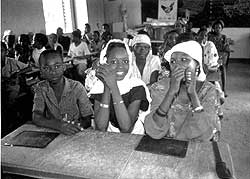 n terms of human development, Nepal is at the botom of the heap in Asia, but with the economy stagnant there are indications that our country is even more badly off than some countries of sub-Saharan Africa.
n terms of human development, Nepal is at the botom of the heap in Asia, but with the economy stagnant there are indications that our country is even more badly off than some countries of sub-Saharan Africa. Now with a full-blown insurgency raging in the countryside, there is a real danger that vital resources will be sucked away from development. But there is hope: if a country like Uganda could rise from the ashes, why can't Nepal?
That was the message Emmanuel Tumuslime-Mutebile, governor of the Bank of Uganda had for Nepal last week at the end of a four-day visit. Mutebile was one of the key technocrats hired by Uganda's visionary president Yoweri Museveni to turn the east African nation around. Uganda's remarkable recovery did not happen by sheer good luck, it was sheer hard work.
"Even up to the mid-1980s we were literally like playing a game of political musical chairs on the deck of the Titanic," Mutebile told us. "Governments were changing fast and all were unable to deliver basic public services." The transformation began in the mid-1980s after Yoweri Museveni was elected president. As the Governor of the central bank, Mutebile helped clean up its moribund financial system and keep watch on the government's purse.
Nepal and Uganda have many things in common: both are landlocked and about the same size in geography and population. Both are relatively resource-poor, and share the same economic make-up-over 40 percent of the Gross Domestic Product comes from agriculture. Nepal may have better resources in terms of hydro and tourism potential, but Uganda has superior governance structures which have been key in improving development parameters.
"The key is the involvement of the political leadership in development and poverty alleviation programs," says Dr Shanker Sharma of the National Planning Commission who was in Uganda earlier this year. "That has not happened in Nepal so far." In fact the key seems to be visionary leadership that can impart direction and hope to a country ravaged by poverty and war.
Mutebile is careful not to sound too prescriptive. "I should be careful not to say too much about my hosts," he told us, "but not saying anything won't help either." Some of his observations:
. "I see the credibility of the state is a major problem, and this may haunt Nepalis even after the Maoists are crushed"
. "I have been talking to many politicians here and I regret to say that I have the impression that politics in Nepal is only about who sits in the chair. If this goes on and if we meet in 10 years from now Nepal will be worse off"
. "Political power must be used to deliver public services. Leaders must have a tenure that is long enough to make it possible to deliver what they promise. Maybe having a agreement on this between political parties would be the place to start and nurture real development"
Uganda has seen the worst a country can. In 1989 it had almost 60 percent of the people living on less than one dollar a day and a parallel economy, where the dollar was sold for 10 times the official exchange rate. If that was not bad enough, HIV/AIDS struck Africa at about the same time.
"We worked with a cash budget based on spending only how much revenue we were able to earn," says Mutebile. "If a ministry did not have money it did not spend it." It was a tough decision and put many development programs on hold, but that also put pressure on the government to create resources, by improving revenue collection and checking leakage. Simultaneously, the government was forced to prioritise development investments-which it actually did, by throwing out over 50 percent of the programs it funded and concentrating only on a few. Many donors were hesitant in the beginning, but it did not take them long to be convinced.
"Once donors see you are serious with what you want to do they will put money because they also want to be associated with success," says Mutebile. Today, Uganda's economy is growing by about 6 percent each year and more and more donors and private investors are willing to be a part of the success story. Aid is flowing faster making up about 30 percent of its GDP annually.
One reason why all that was possible according to Mutebile was political vision, and the space for the political leadership to deliver on its promises. Mutebile says Africa doesn't have a shortage of strong leaders (Uganda's own Idi Amin was one), but it has lacked leaders with vision. Mutebile's prescription for Nepal is a visionary and strong leadership, political will, a political consensus on development priorities and fiscal discipline.


